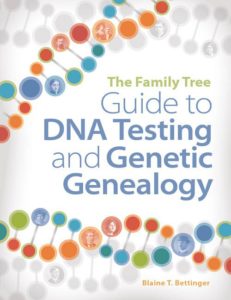Blaine Bettinger is well known among genealogists as the author of the popular blog The Genetic Genealogist. His blog posts offer advice about testing, provide a one-stop destination for important updates about the major testing companies, and sometimes feature examples of how DNA testing has been put to use to solve real genealogical puzzles. Now, in partnership with Family Tree Books, Bettinger has gathered all of his knowledge in one place.
 The Family Tree Guide to DNA Testing and Genetic Genealogy is as good a book as one could imagine for this market. Sure, some of its content will be out-of-date by next year, but it succeeds in every aspect Bettinger and the publisher could control. Everyone from beginners to professional genealogists will find value in it.
The Family Tree Guide to DNA Testing and Genetic Genealogy is as good a book as one could imagine for this market. Sure, some of its content will be out-of-date by next year, but it succeeds in every aspect Bettinger and the publisher could control. Everyone from beginners to professional genealogists will find value in it.
DNA testing is no longer new, but it remains the frontier of genealogy. In the early chapters, Bettinger summarizes the history of commercial DNA testing and introduces the different kinds of DNA (and DNA tests) that can be used to answer genealogical questions. Beginners will learn a lot from his simple explanations of Y-chromosome DNA, mitochondrial DNA, and autosomal DNA and how they can best be put to use. Later chapters, suited for more advanced genealogists, explore third-party tools that can help squeeze even more information out of each test as well as sophisticated ways of combining DNA results with traditional genealogical techniques to solve complex problems. Every chapter contains examples that illustrate the techniques Bettinger discusses.
I found most useful Bettinger’s clear understanding of the ethical questions raised by genetic genealogy. Chapter 3 focuses exclusively on ethical issues, but Bettinger does an excellent job weaving ethics into every chapter. What privacy can you expect from the companies handling your DNA? What should you expect from a professional genealogist with whom you have shared your raw DNA data? (What exactly is that data?) If you’re using other people’s DNA results to identify your own recent ancestor, does that mean someone could use your DNA to identify their ancestors? Bettinger walks readers through all of these and more.
I am a professional genealogist. Some of the my clients were adopted, orphaned, conceived in adultery, or otherwise don’t know their immediate genetic ancestry. Many of the ancestors we’re searching for are still alive. Sometimes genetic testing uncovers secrets some family members would rather have kept hidden. Bettinger does a superb job explaining the official Genetic Genealogy Standards, which address many of these issues, but he is also clear about their limitations. Each case in unique and people who choose to use DNA must understand the potential outcomes and ethical issues before they begin their search.
In a later chapter devoted solely to adoption and similar circumstances, Bettinger summarizes his position: “Although I personally believe that every individual has a fundamental and inalienable right to their genetic heritage, I understand that it does not translate into a fundamental and inalienable right to a relationship with that genetic heritage.” It’s a position I agree with entirely. Identifying your birth parents doesn’t necessarily mean you’ll get to have a warm relationship with them. They may reject you entirely, which raises the question of whether you might regret searching at all. Even when genetic genealogy is used to answer questions farther back in time, you might uncover secrets your ancestors took to the grave. Will that affect how you view them and how you feel about your search? That’s up to you.
Overall, the book is an excellent guide. Key terms, techniques, and ethical considerations all get appropriate space. The writing is straightforward and concise. Graphics and charts are all easy to read and properly labeled in the text. And the whole book is colorful and interesting to look at. I highly recommend this book to anyone interested in learning more about genetic genealogy.
